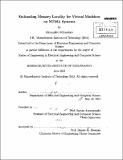Estimating memory locality for virtual machines on NUMA systems
Author(s)
Milouchev, Alexandre (Alexandre M.)
DownloadFull printable version (4.638Mb)
Other Contributors
Massachusetts Institute of Technology. Department of Electrical Engineering and Computer Science.
Advisor
Saman Amarasinghe.
Terms of use
Metadata
Show full item recordAbstract
The multicore revolution sparked another, similar movement towards scalable memory architectures. With most machines nowadays exhibiting non-uniform memory access (NUMA) properties, software and operating systems have seen the necessity to optimize their memory management to take full advantage of such architectures. Type 1 (native) hypervisors, in particular, are required to extract maximum performance from the underlying hardware, as they often run dozens of virtual machines (VMs) on a single system and provide clients with performance guarantees that must be met. While VM memory demand is often satisfied by CPU caches, memory-intensive workloads may induce a higher rate of last-level cache misses, requiring more accesses to RAM. On today's typical NUMA systems, accessing local RAM is approximately 50% faster than remote RAM. We discovered that current-generation processors from major manufacturers do not provide inexpensive ways to characterize the memory locality achieved by VMs and their constituents. Instead, we present in this thesis a series of techniques based on statistical sampling of memory that produce powerful estimates for NUMA locality and related metrics. Our estimates offer tremendous insight on inefficient placement of VMs and memory, and can be a solid basis for algorithms aiming at dynamic reorganization for improvements in locality, as well as NUMA-aware CPU scheduling algorithms.
Description
Thesis: M. Eng., Massachusetts Institute of Technology, Department of Electrical Engineering and Computer Science, 2013. Cataloged from PDF version of thesis. Includes bibliographical references (pages 59-61).
Date issued
2013Department
Massachusetts Institute of Technology. Department of Electrical Engineering and Computer SciencePublisher
Massachusetts Institute of Technology
Keywords
Electrical Engineering and Computer Science.